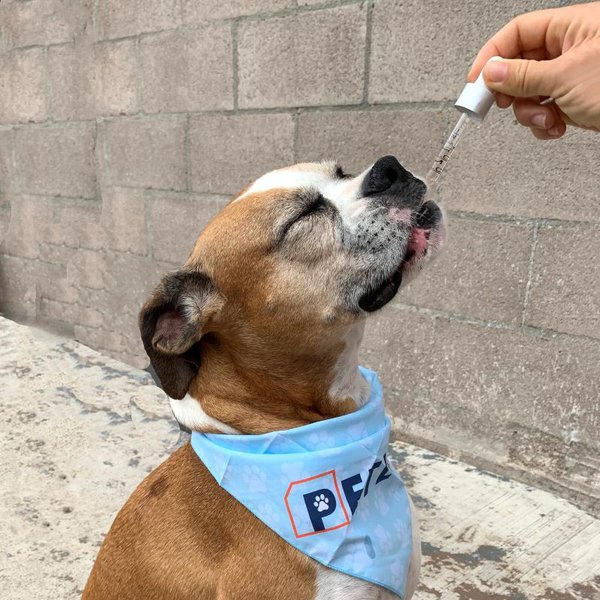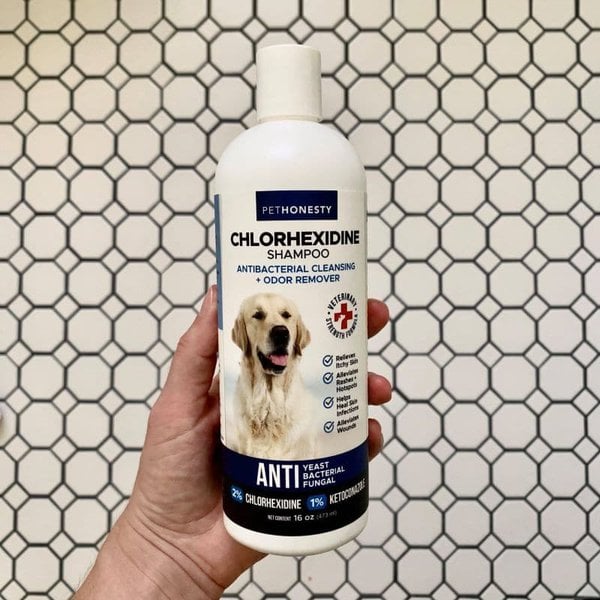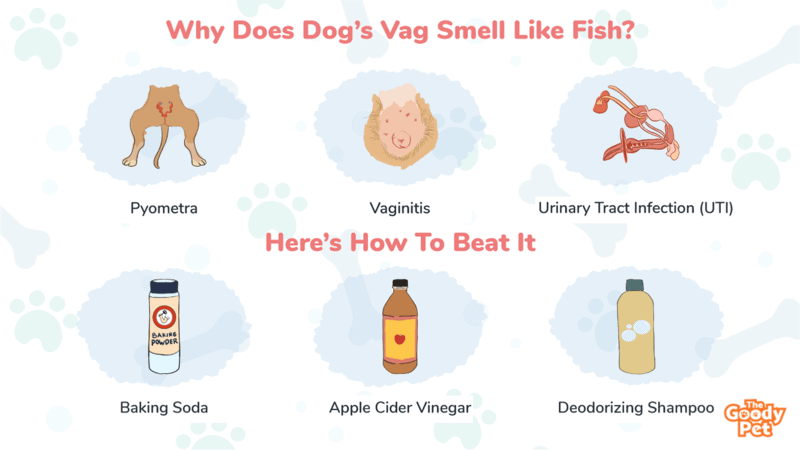It can be quite off-putting to have your dog suddenly develop an unpleasant odor. This is especially true when the odor turns out to be a peculiar fish smell. So why does your female dog smell like fish?
When your female dog’s vagina smells like fish, it is often indicative of a medical condition, namely pyometra. Pyometra is a severe infection of the womb commonly observed in unspayed female dogs. One of its common symptoms includes a foul odor emanating from the vagina, as well as the presence of pus.
Fortunately, the mere fact that your female dog smells like fish does not conclusively mean that they have Pyometra. There are several other less serious reasons why your female dog smells like fish.
What Causes Fishy Smell In Female Dogs?
Your female dog’s fishy odor could be a result of a Urinary Tract Infection, Pyometra, or Vaginitis.
Urinary Tract Infection (UTI)
As the name suggests, a UTI is an infection of the urinary tract. Bacteria are the most observed cause of UTIs in dogs. Dogs are typically more prone to developing a UTI than any other infectious disease.
Escherichia coli is a bacterium that is most commonly responsible for causing UTIs, however, several other bacteria and fungi can cause UTIs. In some cases, a UTI is a secondary condition to illnesses like Cushing’s disease.
Aside from a fishy odor, symptoms of a UTI include frequent urinating, dripping urine, licking of the urinary area, and a fever. Treatment for a UTI is prescribed antibiotics, along with increased water intake to cleanse the bladder.

Pyometra
Pyometra is the infection of the womb. It is a serious health condition that can easily lead to the death of your dog if left untreated.
Pyometra typically develops when your dog is in heat. Usually, when your dog is in heat, it should smell as it normally smells. Therefore, a fishy odor is unusual and is indicative of an infection.
The hormonal changes that your dog experiences while they are in heat, make them prone to developing infections like pyometra. As the infection progresses, their womb will fill with pus, which can lead to kidney failure, blood poisoning, and death.
There are two types of pyometra, closed and open. Closed pyometra occurs when the womb closes and the pus is trapped inside, which may cause the womb to burst. If your dog has an open pyometra, you will see blood and pus coming from their vagina.
Symptoms of pyometra include a foul fishy odor emanating from your dog’s vagina, vomiting, collapsing, exhaustion, and weakness.
The main treatment for pyometra is surgery. Along with surgery, your dog will be required to take medication such as antibiotics, hormonal medication, and be put on a drip to ensure that they remain hydrated.
Vaginitis
Vaginitis is the inflammation of the vagina. It is most commonly observed in unspayed puppies and adult dogs.
Vaginitis has several causes, such as vaginal tumors, vaginal trauma, urinary tract infections, and abnormally situated ureter. As you may expect, the symptoms of vaginitis may vary depending on its cause.
However, common symptoms include frequent urination, licking of the vaginal area, mucus or bloody discharge, and the vagina will look red and swollen.
The treatment for vaginitis is also significantly dependent on its cause. Regardless of what you suspect the cause to be, you should still consult the veterinarian for an accurate diagnosis.
This will ensure that your dog receives the appropriate treatment timeously, which will prevent your dog from having to endure the discomfort for a prolonged period.
Is It Normal For My Puppy To Smell Like Fish?
It is not normal for your puppy to smell like fish. If they develop a fish odor, then they are experiencing dental issues or anal sac diseases.
Anal Sac Diseases
Anal sac disease is an umbrella term used to describe several anal gland conditions, which include infections and tumors.
Impacted glands are caused when your puppy is unable to empty its anal sac. The remaining fluid thickens and becomes challenging for your puppy to empty.
Impacted glands will have to be expressed manually, or else they will become infected. The infection will result in a foul fishy odor and inflammation. Other symptoms of impaction include constant scooting and licking of their back end.
If your puppy’s anal gland is not expressed, and secretions continue to accumulate, your puppy will develop an infection known as anal gland abscess. These abscesses can be quite painful to dogs.
You should take your dog to a veterinarian to have their anal glands properly drained and cleaned before they cause damage to your dog’s anal gland. Your veterinarian will also prescribe antibiotics and pain medication to help your dog recover adequately.
Anal tumors are another condition that forms part of anal sac diseases. Anal tumors are not nearly as common as anal abscesses. They often affect the tissue surrounding the anal gland, and they are exceptionally uncomfortable.
As the tumor grows, your puppy will have a hard time passing stools. The best way to treat these tumors is by undergoing surgery. However, this is not a complete cure since large margins cannot be taken in such a sensitive area.
Dental Issues

Your dog’s breath will not smell pleasant if you do not brush their teeth regularly. An intense fish smell may indicate that your dog has dental issues.
These dental issues include a condition known as periodontal disease which affects the gums of your dog. Puppies develop the periodontal disease when food articles accumulate in their mouths, and when bacteria and plaque begin to accumulate.
The plaque may harden and form a layer between your puppy’s gums and teeth, leading to tissue breakdown, severe pain, and foul-smelling breath.
What Home Remedy Gets Rid Of Fishy Smell On Dogs?
Some effective home remedies to get rid of the fish smell on your dog include using deodorizing shampoo, baking soda, and apple cider vinegar.
Deodorizing Shampoo

As the name suggests, deodorizing shampoos are made to relieve your dog of foul odors that may be trapped in their fur. However, a simple wash is often not sufficient to remove the foul odor from your dog’s fur.
You would typically have to do more than one wash in order to get the smell off your dog. If the smell persists, we would suggest using a secondary product, such as baking soda.
Baking Soda
Baking soda is truly one of the most versatile products out there, it can be used to fulfill several different cleaning jobs, including removing fish smell from your dog’s fur.
After you have used a deodorizing shampoo to wash your dog’s fur, you must rub some baking soda onto them. Then, you should leave it on them for a few minutes before brushing or rinsing it off them.
Apple Cider Vinegar
Apple Cider Vinegar is an alternative to baking soda as a secondary product. Apple cider vinegar is an excellent cleanser, and it can also work as a natural flea repellent.
As opposed to the baking soda that must be used after you wash your dog, you can add a few tablespoons of apple cider vinegar to the water that you intend on using as you wash your dog with a deodorizing shampoo.





